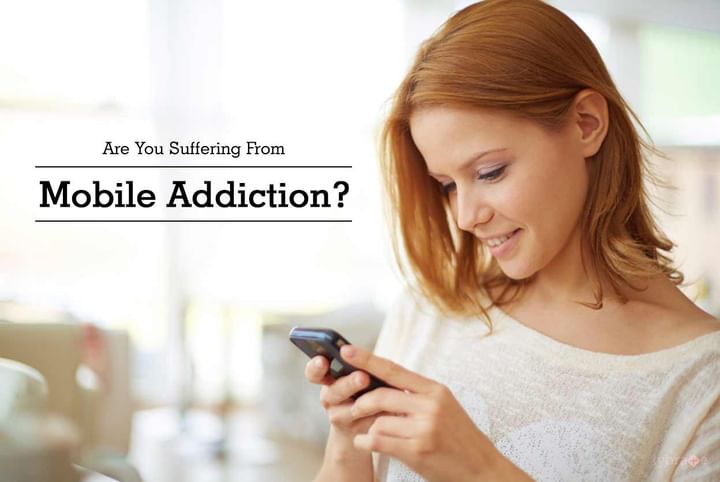Are You Suffering From Mobile Addiction?
The advent of smartphones has made mobile phones far more pervasive in your life. You can now remain connected with friends and family on social media for much longer, share your life events through pictures and videos, stay on track with professional information and generally remain updated about information from all around the world. However, this constant barrage of information and the over dependence on the smartphone for work and personal affairs has taken epidemic proportions where people are unable to log off. It has now been classified as a general anxiety disorder commonly known as nomophobia which is "the fear or being away from your cellphone".
Addiction and the validity of Nomophobia
While cell phone addiction is a valid disorder, the designation of nomophobia is loosely attributed to the anxiety disorders connected to not being able to use cell phones. It’s less of a phobia and more of an addiction as you cannot be without it. These can be better enumerated by the typical symptoms when not being able to use a mobile phone.
Symptoms of mobile phone addiction:
- The ability to spend hours and hours on the cell phone without realizing how much time has passed by.
- Forced attempts to separate from the cell phone result in more time being spent with it (akin to a drug addiction).
- Incremental usages in a number of hours as you end up spending more and more hours on the phone.
- Personal and professional lives being hampered due to excessive mobile phone usage.
- Surfacing of withdrawal symptoms such as irritability, restlessness, anger and depression.
How mobile phone addiction affects people?
Different age groups are affected differently by mobile phone addiction; although some of the symptoms are fairly common. The effect tends to be far more severe on children and teenagers. Let’s look at how different age groups are affected by mobile phone addiction:
Children – Increasingly, younger children are carrying cellphones, especially smartphones. This tends to disrupt their lives as they get easily distracted and thus addicted to chatting with friends and connecting on social media. With children, appetite as well as mental development, is also hindered. In a study in the U.K., it was found that young children with mobile phones had less nutritional intake and thus had lesser and slower physical development than normal. It also affects their eyes. Direct exposure to blue light – like the one that comes from cellphone screens – can cause damage to the retina of the eye.
Teenagers –
- Development: Apart from the similar problems mentioned with children, the performance in school tends to suffer the most along with other developmental disabilities in the brain. The human brain is still forming till the age of 25 and many of the finer faculties that develop during the teenage years get badly affected. Holistic development like hobbies, sports, communication skills are greatly hindered.
- Information overload: Teenagers also tend to be very impressionable and thus are at a risk of predation from sources all-round the internet. While aggressively watching porn, the adolescent brain is being shaped around a sexual experience that is isolating, visceral, and completely void of any love or compassion. This has the potential to lead to great problems in sexual compulsivity and sex addiction throughout the adolescent boy's life because his brain gets shaped to expect the "heroin-like" porn dopamine rush from all of his real-life sexual experiences.
- Peer pressure: Teenagers seek more and more expensive phones in order to compete or to fit in with the crowd. this not only puts more financial strain on the parents but also leads to disharmony at home.
- Friends! Let's stay connected: Very often parents complain that their teenager can do nothing else but sit by their mobile phone waiting for calls or text messages. They no longer communicate with family members and its not uncommon! Catching teenagers staying up till early hours of the morning texting or talking with friends. Their studies greatly suffer, hobbies no longer take priority and problems like irritability, poor concentration, bunking classes and other health issues are on alarming rise due to lack of sleep.
- Emotional issues: In the era where assignments, notes, outing plans, party invites and important messages are passed on in Whatsapp groups. Getting a phone call or a text message implies an importance, ‘Somebody wants Me’!! It boosts the receivers self-esteem and self-worth. The phone also feeds the desire for attention, acceptability and satisfies a teenager’s emotional drive.
- Life on Social media: Nowadays teenagers are more focussed on their Vitual lives rather than enjoying the real moments. Their Life and happiness is all about social display of every single activity and number of likes and comments on posted pictures/ status.This is particularly true for teenagers who are struggling with their identity and social status. Phone usage does not only increase the opportunity to bond with friends and to organise a social life on the move, it also provides a symbol for acceptance. This is important to a teenager’s individuality and confidence. The mobile phone feeds the personal requirements of a teenager - they provide a sense of worth ensuring popularity.
- Strained relation with parents: A great number of teens do not let anyone touch their phones. Most teenagers turn rebellious and aggressive when parents try to limit their mobile usage. When they lose their phones, they show signs of aggression which results in constant mood swings, feeling of unhappiness, and irritation on little things.
Adults – Adults, in general, tend to suffer more from disruptions at work as well as problems in their personal lives. Shortening of attention spans, irritable behavior, fatigue, inability to communicate, breakdowns in spousal relationships or even with friends and family are fairly common consequences. However, the biggest concern is the contribution to depression and anxiety which may run into non-mobile phone related extensive disorders as well.
- Communication Gap in Marriage: Believe it or not, smartphones are damaging and even ending relationships. If you are emotionally attached to your smartphone and rely on it every waking minute, it may be harming your relationship. Psychologists claim that increasing numbers of people in long-term partnerships are having to compete with their partner’s smartphone for attention, making it the ‘third wheel’ in their relationship. A survey found that almost three quarters of women in committed relationships feel that smartphones are interfering with their love life and are reducing the amount of time they spend with their partner. Spouses spend more time in social networkings like Whatsapp, Facebook and days passby without talking to each other. Do you really remember your spouse's phone number or have you just saved it in your iPhone?
- Impact on Child Bearing: Parents stay so busy with their mobiles that they don't spend quality time with their children and fill in the Lacunae by splurging on costly gifts and give them tablets/TV for passing kissing their spare time.
Mobile Use During Driving And Safety Hazards
There is considerable concern that using a mobile phone while driving creates a significant accident risk, to the user and to other people on the road, because it distracts the driver, impairs their control of the vehicle and reduces their awareness of what is happening on the road around them. When using a hand-held mobile phone, drivers must remove one hand from the steering wheel to hold and operate the phone. They must also take their eyes off the road, at least momentarily, to pick up and put down the phone and to dial numbers.While using a hand-held phone, the driver must continue to simultaneously operate the vehicle (steer, change gear, use indicators, etc) with only one hand.
Some tips for de-addiction
Some easy tips that you can follow to start your de–addiction process are mentioned below –
- Ensure that the first 30 minutes of the day after waking up are only for you. Don’t be tempted to look at the phone immediately after you wake up.
- Create specific no phone time zones in a day where no matter how big the urge is, you don’t check your phone. These could be during any time of the day and try incrementally stretching the amount of time that you can be without your phone each time.
- Use driving as an excuse to turn off your phone. This not only helps in fighting addiction but also lowers the chances of automobile accidents caused due to distracted driving.
- Keep a cutoff time for phone usage and switch your phone off at least an hour before your hit the sack. This will stop you from playing late night games and help you sleep better as well. When you feel the urge to check your phone, close your eyes and take a deep breath. If you wish to discuss about any specific problem, you can consult a Homeopath.



+1.svg)
